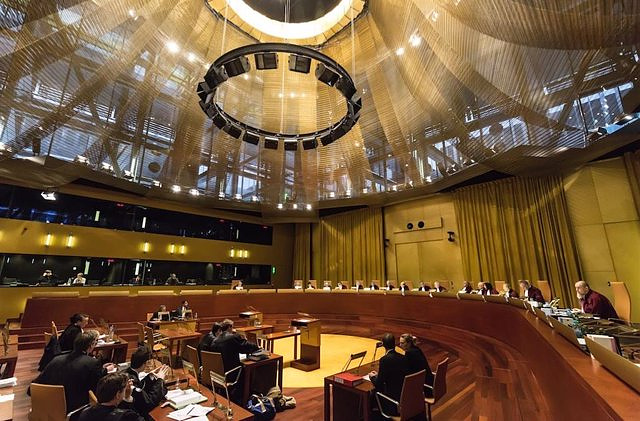BRUSELAS, 2 Feb. (EUROPA PRESS) -
The Court of Justice of the European Union (CJEU) has annulled this Thursday the decision of the European Commission to declare illegal the Spanish system of tax credits ('tax lease') for investors in shipyards and that forced Spain to recover this support , understanding that Brussels did not duly justify the decision, although it supports the analysis that it was a plan with a "selective nature" that favored the beneficiaries over others.
In its pronouncement, the Luxembourg-based court states that the recovery of the entire amount of the aid contemplated by the Brussels decision was ordered on the basis of an "erroneous identification" of the beneficiaries.
However, it dismisses the appeals filed against other elements because it considers that the General Court did not err at first instance in considering that the existence of discretionary aspects could favor the beneficiaries over others in a comparable situation, therefore it could be considered that the consistent measure in early repayment it had a "selective nature".
It also supports the endorsement of the previous ruling to the European Commission in its decision to consider the selective nature of early repayment that the Spanish bonus system was selective as a whole, because the other controversial measures that comprised it depended on the prior authorization of early repayment.
The case dates back to 2013, when the then Competition Commissioner, Joaquín Almunia, asked the Spanish authorities to recover the illegal aid granted to the shipyards under this system between 2007 and 2011, after concluding that the aid regime violated the rules of the EU in terms of public aid because it granted a selective advantage to its beneficiaries over its competitors.
The system denounced by the Community Executive made it possible to finance, through a specific legal and financial structure, the construction of maritime vessels by shipyards and their acquisition by shipping companies at a discount on the price of the vessel. For this, a leasing company and an economic interest group (AIE) intervened as intermediaries.
By declaring the system illegal, the Commission established that the subsidies should be repaid by the investors who financed the construction of the ships, but not by the shipowners or the shipyards themselves.
This system was launched in 2002, although Brussels had proposed that the support granted since April 2007 be recovered, contrary to the position of the Government, which advocated counting from 2011, the date on which the bonus system was considered illegal.
Brussels acted in this case after receiving several complaints from the shipbuilding sector in other Member States, in which it was stated that the 'tax lease' allowed the purchase of Spanish-made ships with discounts of between 20% and 30%. , thus causing the loss of shipbuilding contracts for the complainants.
The Spanish Government and the companies Lico Leasing and Pequeños y Medianos Astilleros Sociedad de Reconversión appealed the Brussels decision before the European Court and requested its annulment, something they achieved with a decision of the General Court of the EU in December 2015, which was later annulled by the CJEU and returned the case to first instance.
In 2020, a new ruling by the European General Court endorsed the decision of the European Commission to consider this tax architecture illegal and demand the return of the aid; a ruling that was appealed and that the CJEU resolves this Thursday partially in favor of Spain and the rest of the appellants in cassation.

 Exploring Cardano: Inner Workings and Advantages of this Cryptocurrency
Exploring Cardano: Inner Workings and Advantages of this Cryptocurrency Seville.- Economy.- Innova.- STSA inaugurates its new painting and sealing hangar in San Pablo, for 18 million
Seville.- Economy.- Innova.- STSA inaugurates its new painting and sealing hangar in San Pablo, for 18 million Innova.- More than 300 volunteers join the Andalucía Compromiso Digital network in one month to facilitate access to ICT
Innova.- More than 300 volunteers join the Andalucía Compromiso Digital network in one month to facilitate access to ICT Innova.-AMP.- Ayesa acquires 51% of Sadiel, which will create new technological engineering products and expand markets
Innova.-AMP.- Ayesa acquires 51% of Sadiel, which will create new technological engineering products and expand markets The PP sees the concentration of support for Sánchez in Ferraz as a "failure" and believes that it "complicates" the story of its continuity
The PP sees the concentration of support for Sánchez in Ferraz as a "failure" and believes that it "complicates" the story of its continuity Marc Márquez returns to pole in Jerez
Marc Márquez returns to pole in Jerez The CIS carries out a quick survey on Sánchez's letter to measure the reaction of citizens
The CIS carries out a quick survey on Sánchez's letter to measure the reaction of citizens 12M.- Puigdemont to Sánchez and Illa: "This is not about the future of the PSOE! What have you believed?"
12M.- Puigdemont to Sánchez and Illa: "This is not about the future of the PSOE! What have you believed?" How Blockchain in being used to shape the future
How Blockchain in being used to shape the future Not just BTC and ETH: Here Are Some More Interesting Coins Worth Focusing on
Not just BTC and ETH: Here Are Some More Interesting Coins Worth Focusing on UPV students build a prototype of a wooden house to move to Equatorial Guinea
UPV students build a prototype of a wooden house to move to Equatorial Guinea The UA opens the call for the Impulso 2024 Awards for the best innovative business initiatives
The UA opens the call for the Impulso 2024 Awards for the best innovative business initiatives ALI, virtual assistant from Alicante, internationally recognized by the OECD
ALI, virtual assistant from Alicante, internationally recognized by the OECD Retrópolis brings the golden age of video games and computing to the UPV
Retrópolis brings the golden age of video games and computing to the UPV A million people demonstrate in France against Macron's pension reform
A million people demonstrate in France against Macron's pension reform Russia launches several missiles against "critical infrastructure" in the city of Zaporizhia
Russia launches several missiles against "critical infrastructure" in the city of Zaporizhia A "procession" remembers the dead of the Calabria shipwreck as bodies continue to wash up on the shore
A "procession" remembers the dead of the Calabria shipwreck as bodies continue to wash up on the shore Prison sentences handed down for three prominent Hong Kong pro-democracy activists
Prison sentences handed down for three prominent Hong Kong pro-democracy activists ETH continues to leave trading platforms, Ethereum balance on exchanges lowest in 3 years
ETH continues to leave trading platforms, Ethereum balance on exchanges lowest in 3 years Investors invest $450 million in Consensys, Ethereum incubator now valued at $7 billion
Investors invest $450 million in Consensys, Ethereum incubator now valued at $7 billion Alchemy Integrates Ethereum L2 Product Starknet to Enhance Web3 Scalability at a Price 100x Lower Than L1 Fees
Alchemy Integrates Ethereum L2 Product Starknet to Enhance Web3 Scalability at a Price 100x Lower Than L1 Fees Mining Report: Bitcoin's Electricity Consumption Declines by 25% in Q1 2022
Mining Report: Bitcoin's Electricity Consumption Declines by 25% in Q1 2022 Oil-to-Bitcoin Mining Firm Crusoe Energy Systems Raised $505 Million
Oil-to-Bitcoin Mining Firm Crusoe Energy Systems Raised $505 Million Microbt reveals the latest Bitcoin mining rigs -- Machines produce up to 126 TH/s with custom 5nm chip design
Microbt reveals the latest Bitcoin mining rigs -- Machines produce up to 126 TH/s with custom 5nm chip design Bitcoin's Mining Difficulty Hits a Lifetime High, With More Than 90% of BTC Supply Issued
Bitcoin's Mining Difficulty Hits a Lifetime High, With More Than 90% of BTC Supply Issued The Biggest Movers are Near, EOS, and RUNE during Friday's Selloff
The Biggest Movers are Near, EOS, and RUNE during Friday's Selloff Global Markets Spooked by a Hawkish Fed and Covid, Stocks and Crypto Gain After Musk Buys Twitter
Global Markets Spooked by a Hawkish Fed and Covid, Stocks and Crypto Gain After Musk Buys Twitter Bitso to offset carbon emissions from the Trading Platform's ERC20, ETH, and BTC Transactions
Bitso to offset carbon emissions from the Trading Platform's ERC20, ETH, and BTC Transactions Draftkings Announces 2022 College Hoops NFT Selection for March Madness
Draftkings Announces 2022 College Hoops NFT Selection for March Madness























